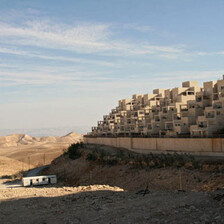The Electronic Intifada 28 April 2009
As the pressure on companies to pull out from business facilitating Israel’s occupation of the West Bank and Gaza Strip grows, it has been recently revealed that in Norway three private banks and the state pension fund invested in one such company.
Norwatch, the Norwegian financial watchdog, reported at the end of March that the Norwegian Government Pension Fund had invested $850,000 in Africa-Israel Investment Ltd. last year. Africa-Israel Investment is an international holding and investment company operating in the area of real estate, construction and infrastructure, energy and related industries sectors. Israeli business magnate Lev Leviev is chair of the company’s board of directors. Africa-Israel is currently the target of a boycott campaign by Palestine solidarity activists because of the company’s involvement in violations of international law in the West Bank. The company has been involved in the construction of several Israeli settlements in the West Bank through its subsidiary construction firm Danya Cebus. It also offers apartments and houses in various settlements in the West Bank through its Israeli franchise of the real estate agency Anglo Saxon, with a branch in Ma’ale Adumim, the largest Israeli settlement.
The occupied West Bank village of Bilin has been holding weekly nonviolent demonstrations against the Israeli wall and settlement construction for more than four years. In a 21 April letter to the Norwegian State Pension Fund village leaders write, “Lev Leviev’s Africa-Israel is building Israeli settlements on our village’s land, and is destroying our olive groves and any hope for justice and peace in Palestine.” The village of Bilin has called on the government and people of Norway to take decisive steps to end all business relationships with Lev Leviev because his companies are constructing settlements.
Israeli settlements in the Occupied Palestinian Territories are illegal under international law. Numerous UN resolutions and the 2004 advisory opinion of the International Court of Justice on Israel’s wall in the West Bank confirm this. The settlements violate Article 49 of the Fourth Geneva Convention — which forbids the transferring of the occupying power’s civilian population onto the occupied territory — as well as Article 53 forbidding destruction of property.
Africa-Israel has come under increased scrutiny as a result of a campaign modeled off of the boycott, divestment and sanctions tactics that are credited with helping end apartheid in South Africa. Last year, the UK government considered relocating the British Embassy to Kirya Tower in Tel Aviv which is partly owned by African-Israel Properties, a subsidiary of Africa-Israel Investments. Attorney Daniel Machover of London-based Lawyers for Palestinian Human Rights warned the British government in an open letter published in the Independent on 20 September 2008 that “renting space from Africa-Israel Properties was tantamount to the government condoning Israel’s settlement-building, supporting clear violations of international law, which in some cases amount to grave breaches of the Fourth Geneva Convention, and hindering the possibility of peace in the Middle East.” In March, British Ambassador Tom Phillips decided not to move the embassy to Kirya Tower. The issue of Africa-Israel’s involvement in settlements and settlement holdings is reported to have played a role in the decision.
In addition to exposing the Norwegian State Pension Fund’s relations with Africa-Israel, Norwatch also revealed that three private Norwegian banks are involved with Africa-Israel through BlackRock Emerging Europe Fund (EEF). According to Norwatch, the banks Storebrand Link and Skandiabanken offer customers the investment product BlackRock EEF. Fokus Bank invites customers to save for their pension in the Danica Link pension scheme with investments in BlackRock EEF. British fund manager BlackRock refused to clarify to Norwatch whether it still invests in Africa-Israel. The last available report on the portfolio of Blackrock EEF dates from October 2008. Storebrand bank told Norwatch that BlackRock, indeed, had investments in Africa-Israel in the third quarter of 2008. The bank promised to carry out an ethical analysis of the company. Depending on the outcome, Storebrand bank will put pressure on BlackRock to divest from Africa-Israel.
An Internet search showed that there are additional European banks offering the BlackRock Emerging Europe fund, including Dutch SNS bank. This bank has already come under serious pressure to divest from the French transport company Veolia for its activities in the occupied West Bank.
On its website, BlackRock claims its commitment to socially responsible investment and the company states it will in the first place seek to understand the social, environmental and ethical policies of companies in which it invests. However, activists argue, this is hard to reconcile with Africa-Israel’s direct involvement in Israel’s illegal settlements.
Zurich-based BlackRock official Jeffrey Provencal did not deny outright the inclusion of Africa-Israel in the Emergency Europe Fund investment portfolio. He responded to an email query, “To date I’m not aware of the fund having a significant holding of the below mentioned company [Africa-Israel Investments].” However, the fund’s investment report of 31 October 2008 shows that BlackRock invested almost $4 million in Africa-Israel.
Adri Nieuwhof is consultant and human rights advocate based in Switzerland.




